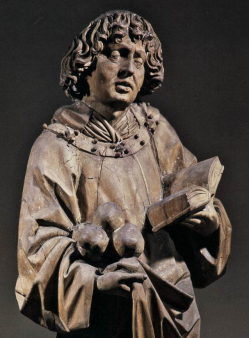It is deeply interesting to think of Saul (Paul) as listening to the martyr's voice, as he anticipated those very arguments which he himself was destined to reiterate in synagogues and before kings. There is no reason to doubt that he was present, although he may not have been qualified to vote in the Sanhedrin. And it is evident, from the thoughts which occurred to him in his subsequent vision within the precincts of the Temple, how deep an impression the death of Stephen had left on his memory. And there are even verbal coincidences which may be traced between this address and Apostle Paul's speeches or writings.
The words used by Stephen in the Temple call to mind those which were used at Athens (Acts 17:24). When he speaks of the Law as received "by the disposition of angels," he anticipates a phrase in the Epistle to the Galatians (Galatians 3:19). His exclamation just before his death, "O stiff-necked and uncircumcised in heart and ears! You do always resist the Holy Spirit; as your fathers did, so also do you" (Acts 7:51, HBFV) is only an indignant condensation of the argument in the Epistle to the Romans (see Romans 2).
The rebuke which Stephen, full of the Divine Spirit, suddenly broke away from the course of his narrative to pronounce, was the signal for a general outburst of furious rage on the part of his judges. They "gnashed on him with their teeth" in the same spirit in which they had said, not long before, to the blind man who was healed, "Thou wast altogether born in sins, and dost thou teach us?" (John 9:34).

In contrast with the malignant hatred which had blinded their eyes, the serene faith of Stephen was supernaturally exalted into a direct vision of the blessedness of the Redeemed. He, whose face had been like that of an angel on earth, was made like one of those angels themselves, "who do always behold the face of our Father which is in Heaven" (Matthew 18:10). The scene before his eyes was no longer the council hall at Jerusalem and the circle of his infuriated judges. He, rather, gazed up into the endless courts of the celestial Jerusalem, with its "innumerable company of angels," and saw Jesus, in whose righteous cause he was about to be put to death.
This was too much for the Jews to bear. The blasphemy of Jesus had been repeated. Stephen, the follower of Jesus, was hurried to his death. It is evident that it was a savage and disorderly condemnation. They dragged him out of the council hall and, making a sudden rush and tumult through the streets, hurried him to one of the gates of the city.
Somewhere about the rocky edges of the ravine of Jehoshaphat, where the Mount of Olives looks down upon Gethsemane and Siloam, or on the open ground to the north, with stones that lay without the walls of the Holy City, Stephen was dragged and put to death. The exact place of his death is not known. But those who look upon Jerusalem from an elevated point on the north-east have both these positions in view. Anyone who stood there on that day might have seen the crowd rush forth from the gate, and the witnesses (who according to the law were required to throw the first stones) cast off their outer garments, and lay them down at the feet of Saul (Paul).
The contrast is striking between the indignant zeal with which Stephen, the first martyr, was put to death and the forgiving love he offered back to them. He first uttered a prayer for himself in the words of Jesus Christ, which he knew were spoken from the cross, and which he may himself have heard from those holy lips. And then, deliberately kneeling down, in that posture of humility, he gave the last few moments of his consciousness to a prayer for the forgiveness of his enemies. The words were scarcely spoken when death seized upon him, or rather, in the words of Scripture, "he fell asleep."
The death of Stephen is a bright passage in the earliest history of the Church. Where, in the annals of the world, can we find so perfect an image of a pure and blessed saint as that which is drawn in the concluding verses of the seventh chapter of the book of Acts?
A heavenly light reappeared with the martyrdom of Stephen, chiefly found in a man called Saul (Paul). The revelation of such a character at the moment of death was the strongest of all evidences, and the highest of all encouragements. Nothing could more confidently assert the Divine power of the new religion.